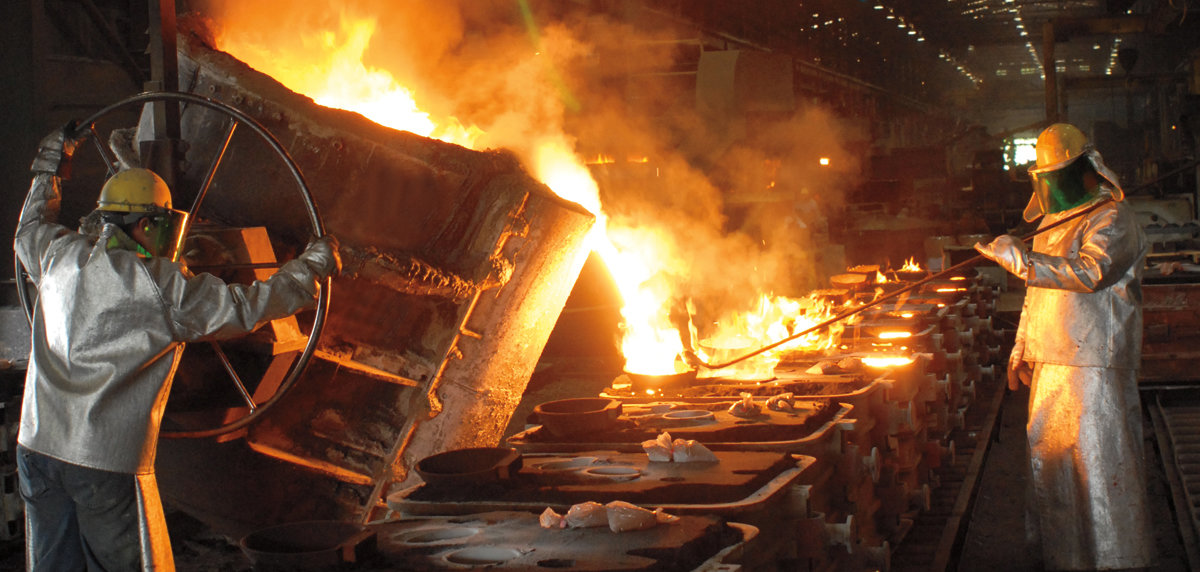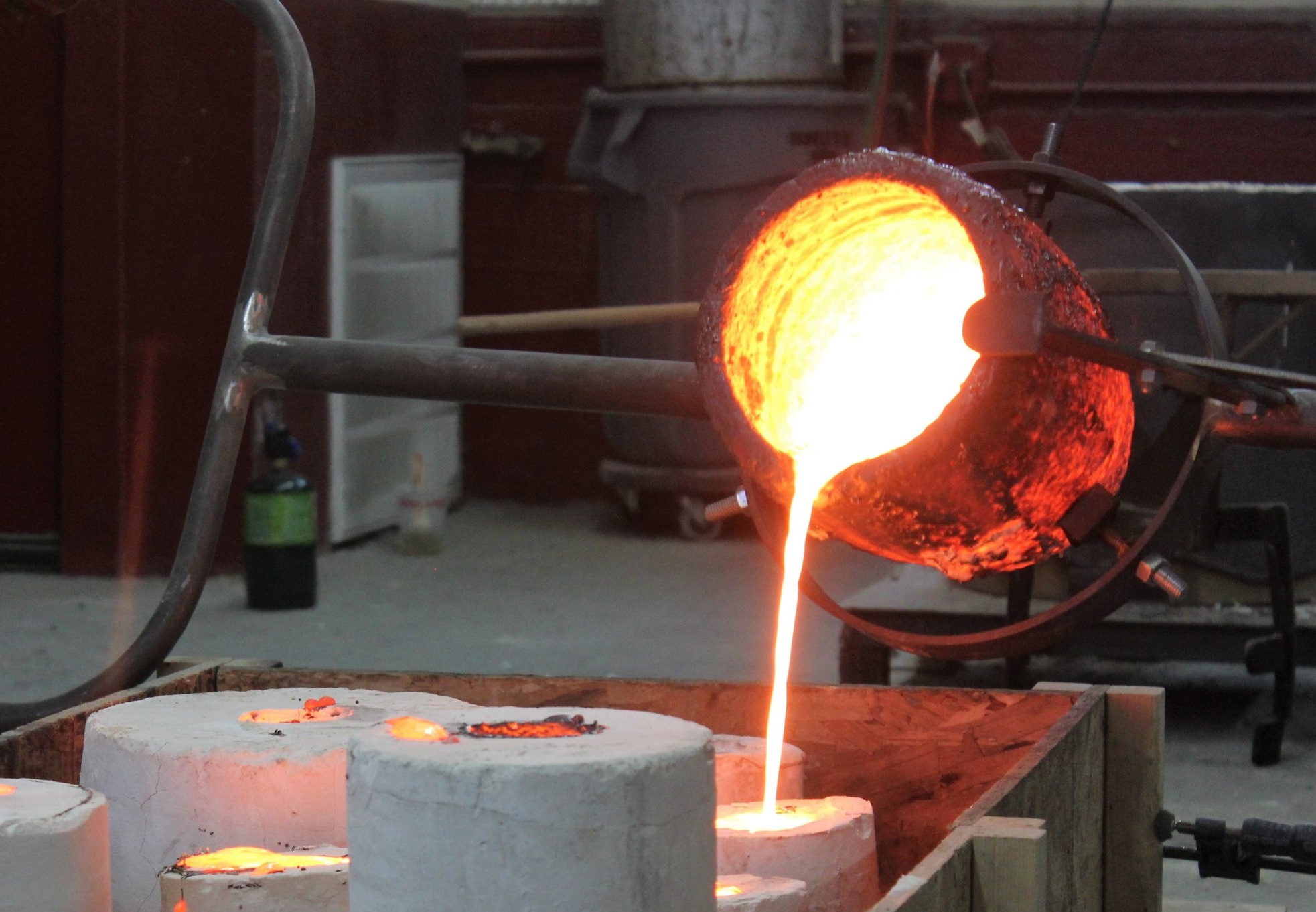A Comprehensive Guide to Metal Casting: Benefits and Solutions Used by Foundries
Metal casting is a crucial procedure in different markets, providing numerous benefits with the services of foundries. These centers change molten metal right into durable and precise parts, dealing with particular customer requirements. By using advanced modern technologies, shops assure top quality and performance in production. The details of metal casting and the varied methods involved increase vital questions regarding its duty in modern production. What developments exist in advance in this necessary field?
Understanding the Metal Casting Process
The metal casting process is a fundamental strategy made use of in making to develop intricate forms and elements. This method includes putting molten metal into a mold made to form the preferred things. The procedure starts with pattern production, which works as a template for the mold and mildew. Aluminum Casting. Different products, such as sand, metal, or ceramic, are used for mold-making, depending upon the details needs of the casting
As soon as the mold and mildew is prepared, molten metal is put into it and allowed to cool down and solidify. After solidification, the mold and mildew is removed, revealing the cast component. Various methods, including sand casting, financial investment casting, and pass away casting, are utilized, each suited to different applications and materials. Quality assurance actions, such as assessments and screening, are necessary to ensure the final product fulfills specs. In general, the metal casting process plays a crucial role in generating components for markets ranging from automobile to aerospace.
Trick Perks of Metal Casting
Metal casting uses substantial advantages that make it a favored manufacturing technique in numerous markets. Its layout adaptability and precision enable intricate forms, while cost-efficient automation boosts performance. In addition, the flexibility and toughness of products used in casting add to the longevity of the final products.
Layout Flexibility and Precision
Releasing exceptional design adaptability and precision, metal casting enables designers and designers to produce intricate shapes and features that would be impossible or difficult to achieve with various other manufacturing techniques. This capacity enables the manufacturing of complex geometries, interior frameworks, and fine information that boost product capability and visual appeals. In addition, various casting strategies, such as sand casting, investment casting, and die casting, offer further options for personalization, accommodating diverse product homes and task demands. The flexibility of mold and mildews allows modifications throughout the layout stage, simplifying the shift from principle to end product. Ultimately, metal casting stands apart for its ability to supply high-precision parts, making it a very useful procedure in industries ranging from automobile to aerospace and beyond.
Economical Automation
Affordable mass manufacturing stands as one of the main advantages of metal casting, allowing makers to produce huge amounts of elements at a reduced price per device. This efficiency emerges from the ability to develop elaborate mold and mildews that can be recycled several times, significantly minimizing setup and functional prices. Additionally, metal casting processes, such as sand casting and pass away casting, permit for high throughput, making it viable to fulfill the demands of massive manufacturing runs. The lowered product waste and power intake additionally improve cost savings, making metal casting an appealing alternative for industries requiring bulk elements. Generally, the cost-efficient nature of metal casting positions it as a recommended approach for manufacturers going for financial efficiency in their manufacturing processes.
Material Versatility and Strength
One of the standout features of metal casting is its exceptional material convenience, which enables for using a wide variety of alloys and steels. This versatility enables producers to choose materials that finest suit their specific applications, from light weight aluminum and bronze to iron and steel. Each metal offers special residential or commercial properties, including varying degrees of toughness, rust resistance, and thermal conductivity. Metal casting can generate parts that satisfy rigid efficiency needs across varied industries, such as auto, aerospace, and building. Additionally, the stamina of cast metals can be boosted with numerous treatment processes, making sure durability and long life. Metal Casting. Overall, the combination of material versatility and inherent strength makes metal casting a favored selection for generating high-grade parts
Sorts Of Metal Casting Techniques
Metal casting encompasses a selection of techniques that accommodate various production demands and product residential or commercial properties. Typical techniques consist of sand casting, which makes use of a sand mold for intricate forms, and financial investment casting, recognized for its accuracy and surface coating. Die casting is another technique that utilizes high-pressure injection of liquified metal right into molds, suitable for automation of tiny parts.
Shell molding uses a quicker alternative, utilizing a resin-coated sand to create thin-walled molds, while lost foam casting permits detailed styles without the need for a core.
In addition, constant casting is used for creating long areas of metal, such as bars or sheets, by solidifying molten metal in a continuous process. Each method provides unique benefits and is picked based upon elements like the called for information, production quantity, and product kind, ensuring remarkable end results in metal construction throughout various industries.
The Duty of Foundries in Metal Casting
Shops play a pivotal function in the metal casting procedure, acting as the facilities where molten metal is transformed right into completed items. These specialized facilities are geared up with the necessary tools and modern technologies to handle numerous metals, making sure top notch results. Factories are in charge of several crucial functions, consisting of thawing the metal, pouring it right into molds, and enabling it to strengthen.
Additionally, they maintain stringent safety and security and ecological requirements to shield employees and decrease environmental impact. Competent technicians and engineers work together to maximize casting processes, boosting performance and reducing waste. Shops additionally engage in quality assurance actions, making certain that the end products fulfill specific resistances and specs. This quality control is necessary for markets that count on precise components, such as auto and aerospace. As an outcome, foundries add substantially to the general production landscape, enabling advancement and development across various fields.
Custom Metal Casting Solutions
Custom metal casting services provide customized layout options that satisfy particular customer needs. These services also provide material choice proficiency, guaranteeing the best metal is selected for the preferred application. Such adaptability and knowledge enhance the total quality and performance of the final product.

Tailored Design Solutions
Customized style options in metal casting give manufacturers with the adaptability to develop elements that satisfy particular performance and visual requirements. Shops offer customized solutions that permit clients to define measurements, shapes, and surface area coatings to achieve desired results. This modification process frequently includes partnership in between designers and developers, making sure that the end products align with operational requirements and market standards. Advanced innovations, such as computer-aided design (CAD) and simulation software, allow precise modeling and testing of elements prior to production, minimizing mistakes and improving performance. By leveraging tailored design options, services can optimize functionality while lowering waste and expenses, eventually resulting in a more affordable side in the marketplace. This flexibility is crucial for industries calling for special applications and specs.
Product Option Expertise
When picking materials for metal casting, proficiency plays a crucial role in guaranteeing that the right option lines up with both efficiency demands and cost-effectiveness. Shops employ skilled specialists who recognize the buildings of different metals and alloys, permitting them to suggest ideal products for specific applications. Variables such as toughness, deterioration resistance, and thermal conductivity are thoroughly thought about to meet the client's requirements. In addition, industry trends and developments in material scientific research inform these decisions, allowing factories to remain affordable. By leveraging their experience, foundries can aid clients in guiding via complicated material alternatives, ultimately causing enhanced product top quality and decreased production expenses. This specialized knowledge is essential for achieving effective end results in customized metal casting solutions.
Quality Assurance in Metal Casting
Quality assurance in metal casting is critical to assure that the end products satisfy the needed specifications and efficiency criteria. Shops use a range of techniques and techniques to ensure the finest quality of cast elements. This process starts with rigorous material inspections, verifying that raw products follow sector requirements. Throughout the casting process, real-time monitoring and testing are performed to examine criteria such as temperature level, mold honesty, and dimensional accuracy.

Applications of Metal Castings Throughout Industries
Metal spreadings play an essential duty in different sectors, acting as the backbone for countless applications. In the automotive field, cast elements such as engine blocks and transmission real estates are essential for automobile efficiency and reliability. The aerospace market counts on accuracy castings for essential components that ensure safety and security and effectiveness in trip. Additionally, the building and construction market uses metal spreadings for components, installations, and structural elements, boosting the toughness of structures and framework.
Furthermore, the energy field take advantage of castings utilized in turbine blades and various other tools important for power generation - Aluminum Foundry. The clinical field likewise utilizes metal spreadings in instruments and tools, demonstrating the adaptability of this manufacturing procedure. In general, metal spreadings are important to the functionality and improvement of diverse industries, showcasing their significance in modern technology and framework development
Regularly Asked Questions
What Materials Are Commonly Used in Metal Casting?
Common products used in metal casting consist of aluminum, iron, bronze, steel, and brass. Each product uses special residential or commercial properties ideal for numerous applications, permitting suppliers to choose the very best choice based upon weight, stamina, and rust resistance.
The length of time Does the Metal Casting Refine Normally Take?
The metal casting procedure usually takes several hours to a few days, depending upon elements such as the intricacy of the style, type of metal utilized, and the specific casting technique employed by the shop.
What Is the Ecological Influence of Metal Casting?
The environmental influence of metal casting consists of energy usage, discharges, and waste generation. Factories often apply procedures to alleviate these results, such as reusing materials and using cleaner modern technologies to decrease their eco-friendly footprint.
Can Metal Casting Be Done for Small-Scale Projects?
Metal casting can indeed be performed for small jobs. Various factories provide to such requirements, supplying customized options that fit limited manufacturing runs while preserving high quality and precision in the end products.
What Are the Precaution in Metal Casting Foundries?
In metal casting shops, security actions consist of individual safety devices, correct ventilation, training on tools use, emergency procedures, normal upkeep checks, and adherence to industry safety and security requirements to reduce risks related to molten metal and unsafe materials.
Additionally, metal casting processes, such as sand casting and die casting, permit for high throughput, making it viable to meet the demands of large manufacturing runs. One more info of the standout attributes of metal casting is its amazing material adaptability, which enables for the use of a wide range of steels and alloys. Furthermore, constant casting is used for generating lengthy sections of metal, such as sheets or bars, by solidifying molten metal in a constant process. Factories play a crucial function in the metal casting process, offering as the centers where molten metal is transformed right into finished products. Typical materials made use of in metal casting consist of aluminum, iron, steel, brass, and bronze.